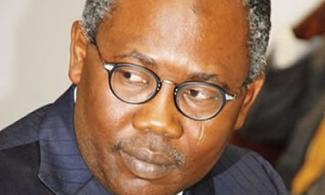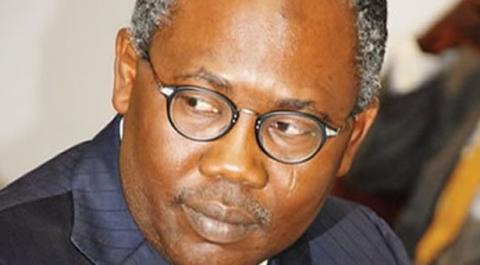
The Human and Environmental Development Agenda (HEDA) Resource Centre had also submitted a petition to Nigeria’s Economic and Financial Crimes Commission (EFCC) that led to the current prosecution of Adoke, Etete and Aliyu in Nigeria.
The Federal Republic of Nigeria (FRN) is currently suing JP Morgan Chase in the English High Court for damages relating to the bank's handling of funds arising from Shell and Eni's allegedly corrupt acquisition of the OPL 245 oil field in Nigeria (case number: CL-2017-000730).
In Paragraph 54D of the FRN's Re-Re-Amended Particulars of Claim, the FRN states that, on 21 July 2011, Mohammed Adoke, who was Attorney General of Federation at the time of the deal, corresponded with JP Morgan from the email address “agroupproperties@yahoo.com”. At paragraph 46D of JPMC's Re-Re-Amended Defence, JPMC admits to the existence and content of the email. As the FRN points out at paragraph 54E of its Re-Re-Amended claim, A Group is a group of Nigerian companies controlled by Mr. Abubakar Aliyu.

A company named, A Group Construction, and another called Novel Properties and Development Company Ltd subsequently became vehicles through which some of the OPL 245 funds transferred by JP Morgan to a company named Malabu Oil & Gas were disbursed.
The email forms part of a chain of correspondence between JPMC and officials of the administration of former President Jonathan. Ultimately, this correspondence led to JPMC transferring a whopping $801 million to Malabu Oil & Gas – money that should have gone to the Federation Account.
The FRN’s Re-Re-Amended Particulars of Claim sets out the trail of emails and correspondences with the bank that led to this loss. This chronology, together with the FRN’s commentary, was also presented.
The email from a “Mohammed Bello Adoke” is highlighted in red.
As will be seen, it formed part of a series of emails aimed at persuading JP Morgan to transfer funds arising from the OPL 245 transaction to Malabu Oil & Gas. In court proceedings in the UK, the FRN has described the OPL 245 transaction as “corrupt” and “a conspiracy to injure [Nigeria] by unlawful means by depriving the [FRN] of monies for the grant of OPL245 to which it was lawfully and exclusively entitled.”
The banks reported that on 21st June 2011 “Bayo Osolake (as a representative of the Defendant) received an email sent by Attorney General Adoke from the email address ‘agroupproperties@yahoo.com’, attaching copies of each of the Resolution Agreements”.
The presentation of the email to the Milan Tribunal received wide publicity, both internationally and in Nigeria.
In response, Mohammed Adoke's lawyer, Kanu Agabi, SAN wrote a petition to the Inspector-General of Police, Usman Baba, dated 5 February 2021 stating: “The individuals who initiated the petition, investigations and the criminal trial at the court of Milan have engaged in acts of forgery of the email document dated 21 June 2011…”
Agabi’s letter was officially received by the IGP on 10 February 2021. The letter was published in online newspapers in Nigeria. The petition also states “the persons or organisations behind these forgeries are the ones that authored the petition to the Economic and Financial Crimes Commission (EFCC), demanding the investigation of the OPL 245 Resolution Agreement”.
Adoke's lawyers did not name names. However, Global Witness, The Corner House and Re:Common were the signatories to the complaint that led to the investigation and subsequent prosecution in Milan.
The Human and Environmental Development Agenda (HEDA) Resource Centre had also submitted a petition to Nigeria’s Economic and Financial Crimes Commission (EFCC) that led to the current prosecution of Adoke, Etete and Aliyu in Nigeria.
Civil Society's response to the Forgery Allegations
On 1 March 2021, Corner House, Re:Common and HEDA wrote to the IGP, categorically denying Mr Adoke’s assertions that they forged the email. The letter was copied to the Milan Public Prosecutor’s Office and the UK Home Office, either of which would have been able to demonstrate the veracity, according to the group, of the following facts:
1. The email first came to light in late 2020 as part of civil proceedings by the Federal Republic of Nigeria against JP Morgan Chase [JPMC] in the High Court in London, where it was disclosed by JPMC and cited by the FRN in support of its claim.
1. The Milan Prosecutor obtained the email through a Mutual Legal Assistance request to the UK Government.
2. The email, which was sent from an email account associated with A Group Properties, was received by an employee of JPMC, who had previous correspondence with Mr. Adoke, on 21 June 2011.
The groups claimed that at the time of the email, none of the groups knew of the existence of A Group Properties, nor of the OPL 245 Resolution Agreements that were attached to the email. At the time, these Agreements were secret and would only have been accessible to parties to the deal, their associates and government officials. The existence of the Resolution Agreements did not come into the public domain until late 2011, months after the email was sent. This alone suggests that the email was sent or initiated by someone with official access to the documents.
3. The original email as received by JPMC will have properties and electronic information that would enable the identification of the IP address from which it was sent.
In the same letter, it was stated:
“We recognise that the email would certainly appear damaging to Mr Adoke. It is therefore understandable that he should try to discredit it. However, the notion that a document furnished by the UK in response to an MLA is a forgery is both entirely fanciful and highly damaging to the reputation of trusted parties to the MLA process. It was obtained through a government-to-government request from Italy to the United Kingdom.
“The documentation is now part of the public record and it is clear from the correspondence that the email was obtained from JP Morgan by the UK Serious Fraud Office and transmitted directly to the Milan Prosecutor. None of our organisations or officials was involved at any stage in the chain of custody.
“The email would certainly appear damaging to Mr Adoke, who is charged in Nigeria with a number of offences arising from the OPL 245 deal. Specifically, the email points to an association between Mohammed Bello Adoke and the Abubakar’s company that subsequently arranged the purchase of a house for Mr. Mohammed Bello Adoke, SAN.
“Mr. Adoke failed to challenge this alleged forged document when it was submitted by the Milan Prosecutor to the Milan Court during prosecution of Mr. Etete and other defendants or at the UK court where it was tendered by JP Morgan. We believe that Mr. Adoke's complaint to you is a deliberate attempt to pervert the course of justice and would request that you investigate.
“We would draw your attention to the fact that Mr. Adoke, was repatriated from the United Arab Emirate by the Nigerian Government (https://barristerng.com/dubai-repatriates-ex-agf-adoke-over-malabu-shell-agip-case/); and that Messrs Adoke and Abubakar are facing trials in three different cases arising from the investigation of the OPL 245 case (FHC/ABJ/CR/39/2017, FHC/ABJ/CR/268/2016, CR/124/17).
“In addition, the Federal Republic of Nigeria (FRN) has recovered $78million related to the OPL 245 deal from the UK – money that was recovered as stolen assets: the FRN is also a civil party to the Milan trial. Depending on the outcome of that trial, the Nigerian State stands to benefit potentially from substantial further compensation.”